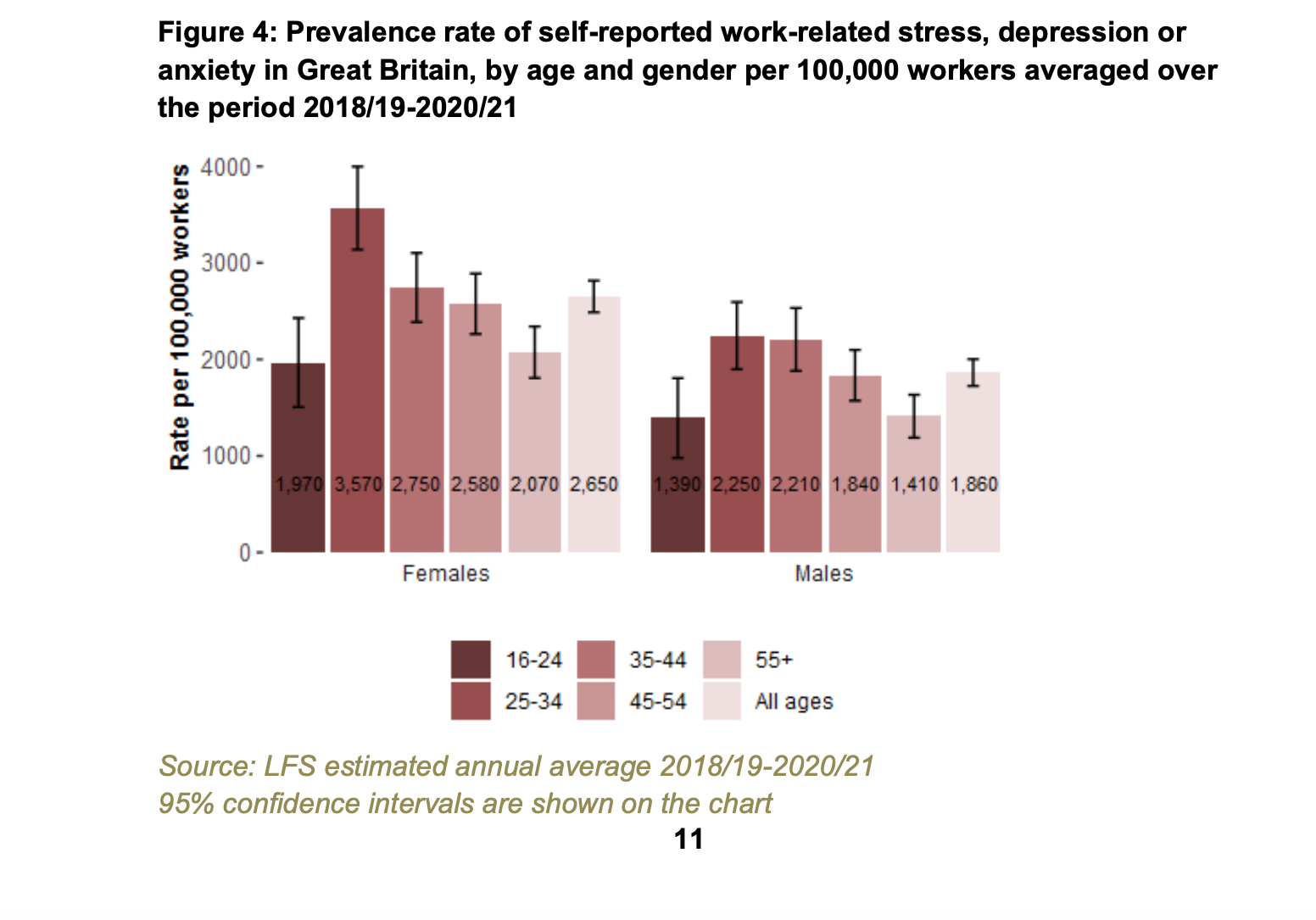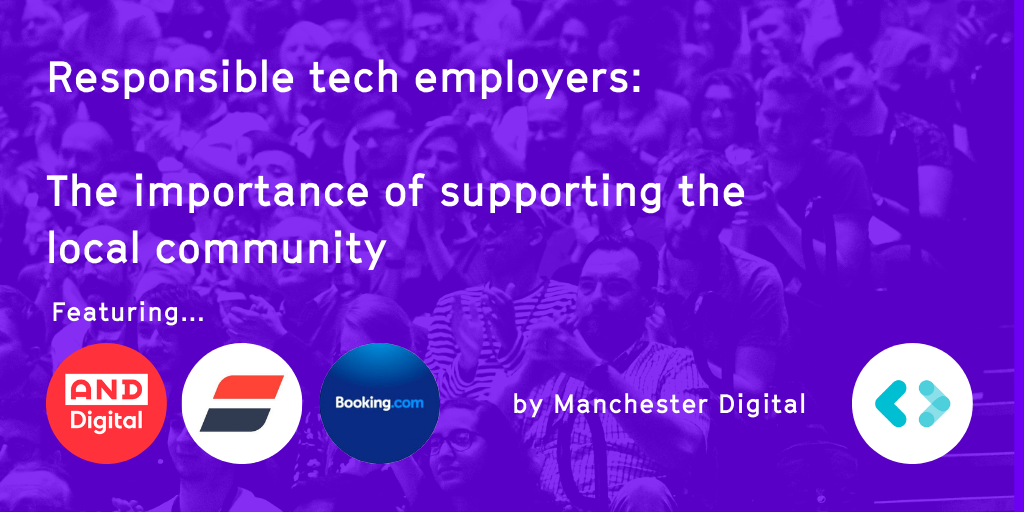
The campaign organisers hope to pressure governments and institutions to implement more support for people suffering from mental illnesses. The Mental Health Foundation has been championing this cause for 70 years, and this year their main focus is to make mental well-being a global priority.
How can you support their cause?
Alongside organising fundraising and donations, one easy way to support their campaign is by buying a green ribbon, the international symbol of mental health awareness.
Why is Mental Health Awareness Important?
According to the UK charity Mind, one in four people will experience a mental health problem of some kind each year in England and one in six will report experiencing a common mental health problem (like anxiety and depression) in any given week in England. While these statistics are impactful in themselves, we also want to highlight the prominence of mental illness in the workplace.
(HSE statistics from 2020/21):
- The total number of work-related stress, depression or anxiety cases in 2020/21 was 822,000, a prevalence rate of 2,480 per 100,000 workers.
- In 2020/21, stress, depression or anxiety accounted for 50% of all work-related ill health cases.
- The most recent data shows that compared to all workers, females overall had statistically significantly higher rates of work-related stress, depression or anxiety and males significantly lower.

It's clear why all companies should have mental health support procedures in place. Sadly, only 13% of 2000 British workers in 2021 said they would feel comfortable discussing a mental health issue at work. We've compiled a list of 10 simple steps that your company can take to foster a healthier work environment:
10 Tips for a Healthy Work Environment
- Create a gratitude culture and work: Numerous studies have indicated that practising gratitude can help to reduce stress and symptoms of anxiety and depression. It's also straightforward to implement into your language in the office. Expressing gratitude to your colleagues is beneficial for both you and them. This can be done as easily as introducing a team member spotlight of the week or just consistently thanking the people around you for their hard work. This environment of gratitude will make employees feel more appreciated and allow them to have a better connection with their colleagues. If you want to take it one step further, why not make a gratitude wall at work?
- Get outdoors on your break: Spending time outdoors has been linked by health professionals to reduced symptoms of depression and an increased feeling of positivity. While the exact reasons for this aren't certain, some professionals believe that it may be linked to the gentle stimulation of all five senses and the increased vitamin D in your body. It contributes to your physical well-being, reducing blood pressure, heart rate, muscle tension, and the production of stress hormones. Additionally, the outdoors helps set your sleep cycle. Cells in your eyes need enough light to get your body's internal clock working right. Early morning sunlight, in particular, seems to help people sleep at night. This may be more important as you age. When you're older, your eyes are less able to absorb light, and you're more likely to have problems with sleep.
- Do things for others: Acts of service are great for others and for improving your mental state. Studies show an increased sense of happiness, contribution, and success. Also, it doesn't usually cost your business to do it. Taking on mentees or volunteering are all free.
- Finding good humour at work: Work can undoubtedly be stressful, and experiencing stress at work may be unavoidable. However, developing a good sense of humour within your team can help alleviate that stress and make arising problems feel shared rather than just one person's issue. Fun Fact: Laughter enhances your intake of oxygen-rich air, stimulates your heart, lungs and muscles, and increases the endorphins released by your brain. Laughter also activates and relieves your stress response.
- Learn something new: Research shows that learning new skills can also improve your mental well-being by boosting self-confidence and raising self-esteem. Learning new things at work can help you build a sense of purpose and connect with others. This can be done by taking a work-related course, shadowing someone from another team, or getting certified in a specific area of your job.
- Find time to slow down: It's easy to get wrapped in the work day, especially when you're busy or there are urgent tasks to attend to. However, designating some time to slow down is crucial. Whether that's stepping outside for a few minutes or simply looking away from your screen and taking a few deep breaths, whatever feels manageable for you, try to add to your work schedule.
- Know where to go for support: A transparent chain of support is essential for any company, and knowing that you can speak comfortably and confidently with a team member is critical to creating a work environment that supports mental well-being. Maya Angelou once said, "there is no greater agony than bearing an untold story inside of you."
- Prioritise work-life balance: This is easier for some than others and even more difficult in the age of working from home. Creating distance between your private life and your work life is essential. This can be done by taking a walk after work, even when working from home. It became a popular technique during COVID-19 lockdowns to create a mock commute to help separate from work at the end of the day.
- Spend time together as a team: Not only does this help create a more effective team, but spending time together outside of work lets people know that they can talk to each other personally and allows you and your colleagues to understand each other better. Practising empathy is a lot easier when everyone actually knows one another.
- Confidentiality: Knowing that you can speak with your seniors in confidence is important to creating an environment where employees can discuss their concerns and mental health. Letting your employer know when you’re struggling will help you both to manage future situations with greater awareness and understanding.
Conclusion
Suffering from mental illness can feel scary and isolating, but developing a work environment that a) reduces the risks of worsening mental health and b) has procedures in place to find support for yourself are essential to mental well-being. We hope our tips and statistics have helped raise awareness about mental health in the workplace and given you some advice on how to curate a workplace that supports mental well-being.








